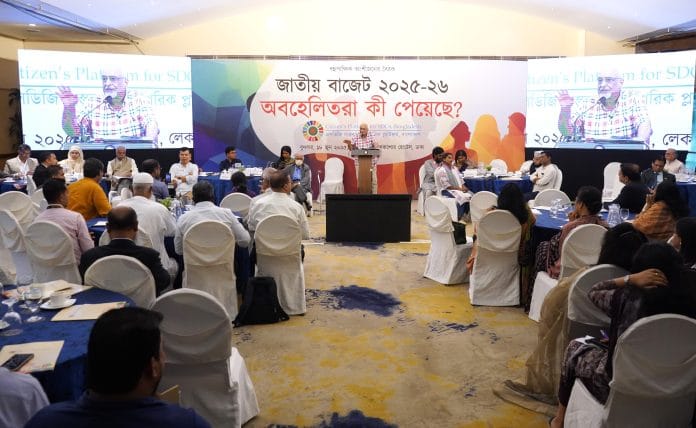The proposed national budget for the 2025-26 fiscal year is against the spirit of equality and reforms, says Dr. Debapriya Bhattacharya, convener of the Citizen’s Platform for SDGs, Bangladesh.
Speaking at a post-budget dialogue of the platform at a city hotel on Wednesday, he said while the government is not an ordinary one, the budget proposals remain conventional and fail to match the transformative needs of the time.
“There are flaws in this budget. It lacks a reform-oriented spirit. The current government, which once promised reforms, has not remained faithful to those commitments,” Dr. Bhattacharya remarked. “This budget is inequitable and disappoints those who expected a break from the conventional budgeting process.”
He believes that the aspirations that emerged from the events of August 5 and the shifting socio-political context were not reflected in the proposed budget while the needs of the marginalised people have also been ignored.
He further noted that the government, which came to power amid calls for change, has failed to deliver on that promise through its fiscal policy.
Echoing similar sentiments, economist and former Jahangirnagar University professor Anu Muhammad pointed out, “This is an interim government. Expectations should have been measured. But given the political backdrop, we had hoped to see the seeds of change—something we do not see reflected in this budget.”
Prof Mustafizur Rahman, distinguished fellow at the Centre for Policy Dialogue, expressed concern over squeezing social safety net. “The proposed budget has shrunk social safety nets. This will negatively affect not only the current fiscal year but also future budgets.”
He cited the example of the old-age allowance, which was increased by just Tk 50 —from Tk 600 to Tk 650—while inflation raised the real cost of living to about Tk 900.
“In real terms, social protection has been reduced. This weakens the moral ground for demanding more inclusive measures from future governments,” the economist pointed out.
Taking part in the discussion, Zia Hasan, a noted accountant by profession, added that the budget failed to reflect the economic stress businesses are under. “Large corporations have seen a decline in sales due to inflation, yet this reality is not acknowledged in the budget proposal.”
Mahtab Uddin Ahmed, president of the Institute of Cost and Management Accountants of Bangladesh (ICMAB), said, “The capital market is on the verge of collapse, and the government has done nothing in the budget to address this.”
Highlighting the continued neglect of the transgender community, activist Sanjibani Sudha said, “There are budget allocations, but they are never implemented. As a result, our living conditions don’t improve, there are no jobs, and we have no income. Many in our community are forced to beg just to survive.”
She also shared her personal experience of being dismissed from a bank job due to her gender identity. “Neither the government nor the private sector supports our inclusion into the mainstream. Discrimination persists on all fronts.”
The event also featured a keynote presentation by CPD Senior Research Fellow Towfiqul Islam Khan, outlining the broader implications of the proposed budget on marginalized groups. The dialogue reflected broad dissatisfaction from economists, civil society members, and community representatives, many of whom see the proposed budget as a missed opportunity to address inequality and deliver meaningful change.

